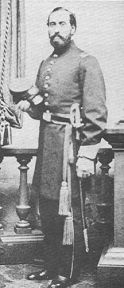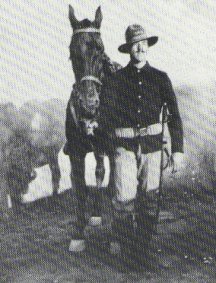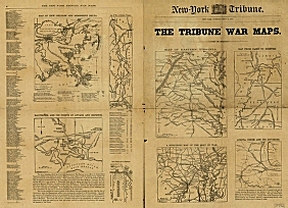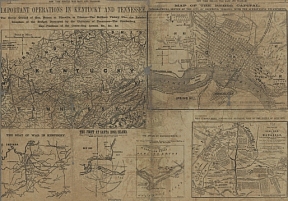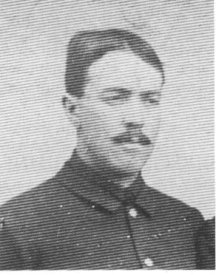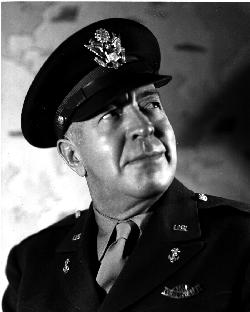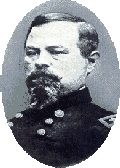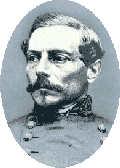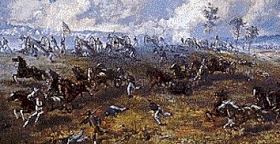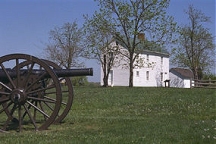SCENES ABOUT CAMP--BY OUR SPECIAL ARTIST
WITH GENERAL McDOWELL'S CORPS D'ARMEE
The scenes included such bucolic activities as recruits engaging
in target practice, washing their clothes in a stream, rigging up a hammock
under the trees, writing letters home, holding mock skirmishes between
outposts . . . a virtual parallel to the scenes currently being played
out all around me by fresh-faced young men in the clean, crisp uniforms
of a bygone era--my father's era! And, to all appearances,
here we stood on the brink of the first major military engagement between
the Union and the Confederacy. Swallowing hard, I turned to Sgt,
O'Dowd again, asking: "That creek down there...it wouldn't happen to be
Bull Run, would it?"
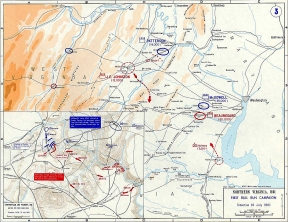 O'Dowd grinned. "Damn, you're good, Major! How'd you figure
that one out? I thought you were a fiction writier, not a historian."
O'Dowd grinned. "Damn, you're good, Major! How'd you figure
that one out? I thought you were a fiction writier, not a historian."
"Lucky guess," I murmured. "Who's in charge of that regiment
down there by the creek?"
"Some colonel. Don't know his name -- he keeps comin' and goin'
between here and some 'headquarters' somewhere. Say, Major, we gonna
stick around for the battle? Lt. Gridley says its gonna start tomorrow
morning -- early."
"Not if I can help it," I replied, rubbing my stubbled chin.
"Any idea where the good lieutenant ran off to?"
"Nah, he kinda keeps to himself," puzzled O'Dowd, "but every time
he returns, he's got plenty o' loot in his grip. He did say something,
though, about looking up some long-lost relatives hereabouts."
"Thanks, Sarge," I said, sniffing the air, which was heavy with the
smell of bacon and coffee. "Think I'll mosey on down to the creek
there and snoop around some myself. Carry on."
As I approached the campfire, I could see that the men of my own
little "regiment" had already made themselves at home in this strange --
yet not-so-strange -- environment. Compared to Mugambi's compound,
this thoroughly American military encampment of another century was familiar
territory indeed. My fellow veterans of the War in the Pacific --
my "Walking Wounded"--actually seemed energized by the one-on-one contact
with these naive farmboys and know-it-all city slickers who had yet to
taste of battle's bitter brew; and those raw recruits, for their part,
were absolutely awestruck by the chance to interview such battle-hardened
veterans of some as-yet unnamed battle in the hinterland. Had we
seen action last month at Big Bethel, down Norfolk way, or at Vienna, just
across the Potomac from the Capitol? Or were we refugees from some
more distant and devastating conflict, news of which had not yet gotten
past the Federal censors? And what of our strange uniforms -- were
we connected with some secret outfit on a daring mission behind enemy lines?
Such were the questions I heard as I made my way through the camp where
my compatriots lay or sat, gratefully wolfing down the rations freely offered
by the admiring, unitiated volunteers of "Mr. Lincoln's Army." Such
questions, of course, amused the savvy soldiers of my little regiment no
end, and their inventive answers were little masterpieces of fiction in
their own right. But the object of my search was not these proven
patriots of the South Pacific; my eyes were peeled for the corpulent countenances
of those two official stowaways, Rokovitch and Paulinov. Nor did
I have far to look.
Close to the campfire -- and the skillet -- sat the two Russian officers
who, "back" in 1945, had so abruptly appeared on the tarmack in Guam, waving
their Sate Department papers and demanding that Gridley delay his takeoff
until the arrival of some mysterious telegram from Moscow. The fact
that he had unhesitatingly refused, putting the medical needs of his passengers
ahead of the Russians' threats of political retribution upon his "bourgeoise
black hide," impressed me deeply. All the deeper, then, my shock
and confusion upon discovering the lad sitting there between these two
accomplished con-men like Pinnocchio between the Fox and the Cat.
He was absorbed in some intense dissertation pouring from the lips of Rokovitch,
the senior officer of the pair. It was then that I realized that
Gridley was wearing my cap--the one with the "time-space continuator" sewn
into the sweatband!
Swallowing my chagrin, I approached the campfire, determined to get
to the bottom of this disturbing turn of events. Happily, another
of the "Walking Wounded," seated opposite them across the fire, spoke up.
"Here, Major -- you look like you could use a cup o' java;" and he
held out a steaming tin for my inspection. Grateful for this gesture
of camaraderie in the face of impending confrontation, I took the proffered
cup and sat down on a vacant camp-stool. Through the billowing steam
as I raised the cup to my lips, I glanced at Gridley and the Russians to
find all three of them eyeing me expectantly. Good, I thought,
I
won't have to work to get their attention. Not wanting to lose
whatever small advantage that gave me, I raised my head and spoke directly
to Colonel Rokovitch.
"So, Colonel . . . which newspaper are you pretending to represent?
Die
Weltische Zeitung? La Gazette Parisienne? Or something
closer to home, like Pravda?"
Caught in his deception -- of which, I had rightly guessed, young
Gridley was unaware--the Russian glared at me, then turned to say something
to his new protegee, who had already risen to his feet with a look of disillusionment
and disgust. Rokovitch's remarks were cut short by Gridley's own:
"Guess you white folks is all th' same, after all!" And, dashing
the contents of his cup towards the fire, he once again stormed off for
parts unknown. Rokovitch turned towards me again, his usual disdain
for me now grown into a seasoned hate.
"Perhaps the Major does not realize, the Geneva Convention does not
apply to the present conflict," the Russian said with obvious relish.
"Nor that, even though we are technically on American soil, we are no longer
bound by agreements between our respective governments that do not yet
exist."
Smiling at such bureaucratic hogwash, I replied, "Colonel, you are
a source of endless amusement. Do you really think that any of us
can act with impunity simply because we are out of our proper time and
place? Reason alone dictates that, if anything, we should all proceed
with even greater caution in these circumstances."
That seemed to stump him momentarily, which gave his partner leave
to join the discussion.
"Ah, Major, iss you who do not understand! Vee haff
dee -- how you say? -- dee Moeglichkeit -- dee opportunity to shape,
to fashion dee Zeitgeist here in diss vilderness! Herr Marx
hass not yet written a single verd of his great thesis, und --"
A sharp slap on the cheek from his superior's hand silenced him in
mid-speech.
"Dumbkopf!" the colonel roared, following-up with a string
of invective in Russian that I could not follow, but whose import I understood
perfectly. Paulinov had already spilled too much of their game plan,
and Rokovitch would have his hands full in the immediate future, trying
to regroup and rethink. Meanwhile, he would still need a safe haven
to hole-up in during the coming conflict which we all knew to be but hours
away. Turning to the GI beside me, I started issuing some orders
of my own.
"Corporal, do you know the whereabouts of the rest of your unit?"
"Yessir! Lt. Gridley appointed me quartermaster."
"Gather them together and meet me inside my . . . tent . . . as soon
as possible. We're moving out at 1300 hours."
"Yes sir!" he said, with evident enthusiasm, and hobbled off on his
mission.
Turning to Rokovitch, I said, "You are, of course, welcome to join
us, Colonel," and, not waiting for a reply, I headed back up the hill.
I wasn't even halfway up, however, when approaching hoofbeats announced
yet another visitor -- a scout -- who wasted no time in delivering his
message:
"Seventy-first New York Regiment," he shouted to all within earshot,
"break camp at once and reassemble up by th' stone bridge."
"Where's th' colonel?" someone shouted back.
"Locked in some big hub-bub back at headquarters, with all t'other
commanders. After that fiasco at Blackburn's Ford t'other day, th'
8th New York and th' 4th Pennsylvania have headed back to Washington, but
the 1st Rhode Island volunteered to stay on, God bless 'em! You're
to hook up with them along the turnpike above th' bridge."
"Somethin' big's a'brewin'!" another soldier shouted.
"Amen, brother!" cried the scout, as he wheeled his mount and sped
away.
I grabbed the sleeve of a soldier rushing past me, shouting, "You're
with the 71st?"
"Aye, that I am, sir. What would ye?"
"Is there a Private Burroughs among ye?"
"George? He's back in Washington, at the infirmary -- laid
up with dysentery like half the outfit! Who wants t'know?"
"Friend o' th' family," I said wistfully. "I heard about his
enlistment from . . . his fiancee. Y'could say she asked me to check
up on him, as long as I was in th' neighborhood."
"Well, this looks like one battle ol' Georgie's goin' t'miss out
on -- less'n he makes a miraculous recovery," the fellow said, excitement
welling up in his eyes. "Fact is, if'n he don't hurry up an' mend,
he'll miss th' whole damned war! Why, we oughta be in Richmond by
this time tomorry --"
"On to Richmond!" shouted another soldier passing by, and the cry
was taken up by others in rapid succession until it grew into a veritable
chant. Tearing myself away from the mounting madness, I scrambled
further up the hill to the relative safety of my "tent." Upon reaching
it, I could not resist commenting to Sgt. O'Dowd on the insanity below:
"Poor bastards . . . they actually think this thing will be over in a matter
of days. At least we knew from the get-go that we were walking into
hell."
"Too bad we can't warn 'em, Major," mused O'Dowd.
"The less we interfere, the better, Sarge," I said. "If Lt.
Gridley shows up, get him inside here pronto. And Cpl. Blodgett should
be here soon with the rest of the unit -- send 'em all in, too."
"And the Russians, Sir?"
"Yeah, them too."
The scene inside the tent was even more insane than that without,
for the latter at least was within my ken, and subject to the logic of
experience. What precedent was there for a structure whose interior
was several times larger than its exterior? And how had the "reconstituted"
B-24 transformed its own exterior to match its new environs? General
Groves' hasty briefing on the eve of our departure from mid-21st century
Kenya was the only explanation that made any sense, yet it made no sense
at all -- a machine that was not a machine, but was in effect a living
organism? I would need a lot more convincing. Hopefully, Gridley
could shed more light on things when he finally showed up!
I determined to examine the interior of the ship from stem to stern.
Noting an abundance of daylight flooding through the nose cone, I made
my way up towards the cockpit. I had just reached the radio/navigation
compartment when I began to detect a rhythmic sound coming from the left
side of the cockpit. Snoring? Yes, by God, and I knew whose
snore it was! Removing my cap, I tiptoed into the cockpit to find
First Lieutenant Ulysses S. Gridley fast asleep in the pilot's seat,
his feet propped up on the back of the bombardier's seat. Pitching
"my" cap into Gridley's lap, I was already pinching the cowl of "his" cap
-- the one he had pilfered from me in my drug-induced stupor on our "return"
trip -- when he startled awake. Settling into the co-pilot's seat
and fitting the cap to my head, I attempted once more to engage the agitated
youth in some semblance of a conversation.
"Okay, Lieutenant, its just you and me here. If you feel the
urge to leave the room again, I sure won't try and stop you. But
I did think you might want to hear my 'take' on what's bugging you."
"Your 'take'?" he echoed. "Your 'take' . . .
Your
'take' on what's bugging me? Oh, Ah jes' cain't
wait
to heah Massah Bwana-Mukubwu Munango-Keewati Tar-mangani Majuh
Cuh'nul Edguh Rise Borrows gimmee his personal expert analysis and
considered o-pinyun of what the hell is buggin' this 22-year-old
kellered boy who wuz jes' mindin' his own bidniz flying dis hyeah
broken down ol' B-24 back an' forf twixt Guam and Oahu on accounta becuz
Ol' Loo-tennant Tyrone Kiss-My-Ass Powers is too bizzy signin' autographs
an' gittin' his goddam beauty sleep, so Ah gits t'get Mah
black ass sucked inta yo' personal time-travellin' nightmare!
Yes, Captain Jack, I would simply love to hear your . . . umm, how
did you put it, Old Bean, your . . . 'take'. Do proceed."
"Now just a minute, Bub," I hastened to reply. "It wasn't me
that landed us here in Virginia on the eve of the god-damned Civil War!
What did you think you were doing using this time/space thingamabob
to override Mugambi's systems?"
"That's just it, Major," he said slowly, deliberately, as
if I were a child just learning his lessons. "Sure, I took the 'continuator'
while you were 'out of it', but I wasn't trying to override
anything. I was focussing on Pearl Harbor, Hickam Field, 15 July
1945 -- everything I could think of associated with my regular run.
I've made that run a thousand times, I can do it in my sleep. I know
every wind pattern, every constellation in the southern sky -- hell, I
can even smell those damned islands from 20,000 feet! I provided
more raw data for that gizmo to work with than you'll ever know.
Don't you get it, Major? You weren't within 50 feet of the
damned thing, and yet you were controlling it -- in your sleep you
were controlling the TSC unit that I was wearing! I know
you were because all these images of people and places I never even heard
of
kept flooding into my head from the minute I put it on. F'rinstance
-- who the hell are George and Mary Evaline?"
"My parents," I whispered, suddenly dry-mouthed and faint-headed.
Glad that I was already seated, I began remembering -- in snatches, fitfully
at first, and then in greater detail -- the battle of wills that Gridley
was describing: my own unconscious mental images locked in a titanic struggle
with the lad's conscious ones . . . my deepest, earliest, and dearest recollections
of Mama and Papa and the world they had spoken of so often (that same "bygone
era" in which we were now enmeshed) striving for dominance with Gridley's
acquired knowledge of longitude, latitude, and altitude. Poor kid
never had a chance! The sheer number of memories accumulated by a
man my age -- plus the unrestrained force of an unconscious reservoir of
experiences -- must have become all the more overwhelming the more he tried
to narrow and focus his conscious mind on selective and arbitrary details
of geography and chronology.
"I'm sorry, lad" was all I could manage to say. "Dreadfully
sorry . . . I had no idea . . . ."
"You had no idea?" he snorted. "Hmph! I had
no idea that you -- in person -- are even weirder than those stories of
yours. Otherwise, I would've taken off without you that day
in Guam. But I guess, from the looks of you right now, you never
even realized you had any extraordinary abilities -- aside from your charming
way with words, that is."
"Tell me this is all one big mass hallucination, Looey," I moaned,
doubling over and burying my face in my hands. "At this point, I'd
welcome spending the rest of my days in a padded cell -- compared to the
alternative!"
The voice that spoke to me in that moment of despair was Gridley's
-- and yet, strangely, not Gridley's. To this day, he swears it was
the voice of one of his ancestors speaking through him:
"Is this the mind that hatched a thousand plots? That
birthed the topless towers of Helium? Or maybe I'd just better check
your pulse to see if . . . you still live?"
Whatever the source -- and I have my own opinion--I was jolted out
of my self-pity by a sudden realization: Papa still lived!
The soldier I had accosted halfway up the hill had confirmed a fact I knew
well from my mother's many tellings of the tale -- how Papa had nearly
missed the opening battle of the Civil War due to a bout with dysentery,
but stole away from the infirmary just in time to rejoin his regiment and
play his minor (but none the less historic) role at Bull Run. And
every minute we spent in this time and place was contributing to the potential
altering
of that history! The paradoxes of time travel had been amply explored
in numerous stories over the 1920's, 30's, and 40's -- in some of the very
same magazines in which I had been publishing my own "damphool" fiction.
"Gridley," I shouted, leaping to my feet, "we've got to get
out of here -- all of us -- as soon as possible! I gave Cpl.
Blodgett orders to round up the rest of the unit -- what can you tell me
about Rokovitch's plans?"
"Oh, you don't want to know, Major," chortled Gridley. "That
crazy bastard actually thinks he can foment a revolution right here in
these United States. And guess whose ancestors he wants to use as
cannon fodder?"
"I just hope I took the wind out of his sails long enough to get
him and his comrade back on board. He wasn't planning to 'jump ship' or
something, was he?"
"That freeloader?" the lad sneered. "What -- and miss a meal?
No, he'll stick to us like glue -- at least until he figures out how we
got here. He knows it has something to do with that hat of yours
. . . don't ask me how he knows, but he does."
"Well, leave 'em to me -- you're gonna have yer hands full gettin'
this bird fired up and ready for take-off. Once the rest of the men
show up, make sure they stay put."
"Good luck, Major," he said, as he started checking instruments.
"I wish you'd take someone with you -- say, O'Dowd?"
"Good idea," I replied as I exited the cockpit.
Emerging into daylight, I was pleased and relieved to see Blodgett
and the "Walking Wounded" trudging up the hill.
"Any sign of the Russians," I asked Sgt. O'Dowd. "I left them
down by the campfire."
"That regiment, the 71st," the sergeant explained, "when they broke
camp, they doused the fire and the Russians raised holy hell. Then
the two of 'em wandered off downstream."
"Well, c'mon, Sarge," I sighed. "Let us leave the ninety-nine
and seek that which is lost."
"Amen, sir," he smiled, and we started off at a brisk pace.
Their tracks were easy enough to follow in the soft loam of the riverbank,
but soon we came to a ford and their spoor got swallowed up in the countless
bootprints and hoofprints leading down to it. A few yards beyond
the muddy thoroughfare all traces of shod feet abruptly ceased, and
so we turned to trek up the beaten path, hoping to catch up with either
our quarry or someone who may have encountered them. At the crest
of the hill, we stopped to survey the way ahead. A broad expanse
of open field stretched out before us, a split-rail fence bisecting the
brown rut that disappeared into a line of trees on the horizon. And
clambering gingerly over the fence was a lone Union soldier, laden with
his gear and headed in our direction. Upon spotting us, he stopped,
squinted, and crouched down, bringing his rifle to the level. O'Dowd
-- instinctively -- did the same, but I stepped forward at once,
my arms outstretched towards them both and my head turning back and forth
to maintain eye contact with both men as I said to O'Dowd: "It's our uniforms,
Sarge! He can't place our uniforms, that's all. Put up your
rifle, for Chrissake . . . and stay put, while I go parlay with him."
O'Dowd reluctantly did as ordered, while I advanced towards the stranger,
my arms half-raised, palms outward. Once he saw the miniature Stars-and-Stripes
patch on my sleeve, he put up his own weapon and proceeded to scratch his
head.
"All right, old fellah, that's far enough," he called out when I
was about six yards away from him. "I can see you're Federal personnel,
but I'll be damned if I can tell your rank. State your business,
please."
"Special correspondence corps," I fudged. "Michigan Businessmen's
Militia . . . we're on assignment from Harper's Weekly. We seem to
have misplaced two foreign correspondents -- Russians, actually -- in our
employ. We lost their trail in all this muck, but this must be the
way they went . . . ."
"Russians, ye say?" the young man echoed. "Yeah, I seen 'em
-- passed 'em back there a good half-hour ago. Headed for Washington
they was. Miserable sonovobitches, I must say. Same get-up
as you boys, though, except for Old Glory there," and he pointed at my
sleeve.
"Well, son, have you any remarks for the press, as long as I've got
you here?" and I pulled a notebook and a pencil from my pocket, for verisimilitude.
"Hell, yes!" he beamed. "We'll hang Jeff Davis from a sour
apple tree, come sun-up. You can quote me on that, Grandpa."
"Very well, young man. And whom do I have the honor of quoting?"
"Private George Tyler Burroughs, Company G, 71st New York Regiment.
And God save these United States of America!"
It was at this point that Major Burroughs' letter to me abruptly
ended -- no signature, no further explanation, no reference to the balance
of his strange tale, which lay tantalizingly before me in the thick, bound
manuscript he had enjoined me not to open. Dubious but dutifully,
I stowed the letter in my shirt and stashed the miniature plastic disk
among my own collection of 45- and 78-rpm records, and went to bed.
Came Christmas morning, the strange package was quickly forgotten
in the mad dash to open all the really important gifts before Nan and the
kids and I hurried out to Church. But, apparently, the FBI had not
forgotten and, true to Jack's prediction, we returned that morning to find
our house ransacked and the only item missing was . . . that damned, mysterious,
unread manuscript!
Now I am an old man, with a story or two of my own to tell . .
. but none as strange as that which follows here--a tale of dark deception
and high heroism in a time and a place hauntingly familiar, yet tinged
with an undefinable air of impossibility. And yet, what possible
meaning can the word "impossible" retain in the face of a manuscript downloaded
in 1999 from a compact disk manufactured in 1950?
Malcolm McHugh
Philadelphia, Pennsylvania
January 1, 2001

